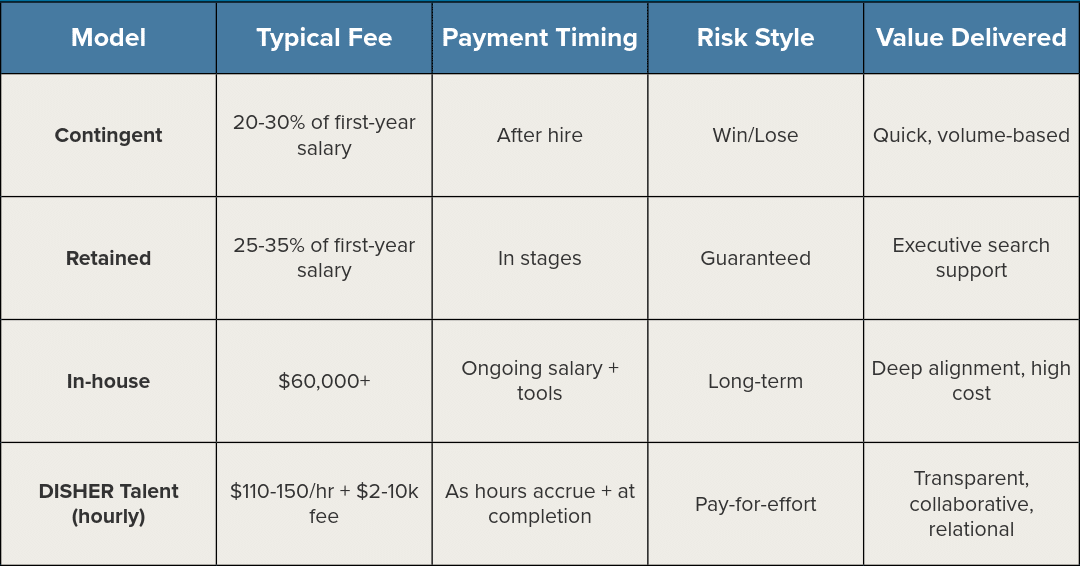
Hiring is already hard. Pricing out a recruiting firm shouldn’t make it harder.
If you’re unsure about the cost of working with a recruiting firm—or worse, you’re worried you’re going to overpay for something that doesn’t deliver—this blog will break it down for you. We’ll walk through the actual numbers behind different recruiting models so you can:
- Understand the most common pricing structures (and what they include)
- See what impacts recruiting firm pricing
- Avoid common misconceptions (like “contingent = free”)
- Compare options clearly, including how our price stacks up
- Know what questions to ask before signing any agreement
How Much Does It Cost to Hire a Recruiting Firm?
Let’s get right to the numbers.
- Contingent recruiters typically charge 20-30% of the hired candidate’s first-year base salary. So, if you’re hiring a $100,000 engineer, you’re looking at $20,000-$30,000.
- Retained search firms often cost 25-35% (sometimes more for executive roles), split across milestones.
- In-house recruiters cost as much as a full-time employee. The industry average salary is around $60,000, not including benefits or tools.
- Hourly recruiting services (like DISHER Talent Solutions) charge by the hour. For example, our prices range between $110-150 plus a completion fee ranging from $2,000-$10,000 depending on the role and scope.
Those numbers are good benchmarks, but the real cost isn’t just in the invoice. It’s also in your time, vacancy cost, and the quality of the hire.
Most Common Pricing Models Used by Recruiting Firms & What They Include
Contingency Recruiting Fees
This is the “pay when you hire” model that’s most traditionally used.
Contingency recruiters only get paid if you hire someone they bring you. Their standard fee is 20-30% of the base salary. Some firms negotiate, especially if you work with them exclusively for multiple roles.
Because they’re unpaid until you say yes, many work fast and wide, submitting lots of candidates to lots of clients, often with less alignment to your culture or long-term needs.
Retained Search Firm Pricing
Retained firms are typically used for high-level or executive searches. You pay them in stages—one-third upfront, one-third at the shortlist stage, and one-third upon hire. Expect to pay 25-35% of the first-year salary.
Retained firms typically offer more white-glove service, including role definition, competitor mapping, and deeper vetting. While the cost may make sense for high-level roles, it usually doesn’t for mid-level or technical hires.
In-house Recruiting Costs
Hiring a full-time recruiter might make sense if you hire constantly or need ongoing support across departments. Base salaries in the U.S. average $60,000, and that doesn’t include recruiting tools like LinkedIn licenses, ATS platforms, or benefits.
Hourly Recruiting Model
This is our model. We charge by the hour, like you would for most other types of consulting. Our rates range from $110 to $150 per hour, depending on the complexity of the role and services included.
We also charge a completion fee, usually between $2,000 to $10,000, again varying based on the complexity of the role and services included. That gives us skin in the game, but you’re still paying for the effort, not just the result.
What Factors Impact How Much You’ll Pay a Recruiting Firm?
Recruiting firm pricing isn’t one-size-fits-all. Here’s what might drive prices up or down.
- Role difficulty: Niche roles take more time and effort (and may demand more senior recruiters).
- Level of hire: Entry-level hires are cheaper than VP-level searches.
- Industry: Tech, engineering, and healthcare roles typically cost more due to talent scarcity.
- Location: Remote roles open the pool; rural locations often require more search effort.
- Time-to-fill: Need someone fast? That urgency may increase the price.
Are Contingency Recruiters Really ‘Free Until You Hire’?
Not exactly.
Yes, you don’t pay until you hire someone, but that doesn’t mean there’s no cost. Contingent recruiters are incentivized to move fast and close quick, which can lead to:
- Poor candidate fills
- Multiple agencies sending the same resumes
- Shallow vetting
- A transactional experience instead of a true partnership
Think of it this way: If five recruiters are racing to fill your role, they’re not competing to find the best person—they’re competing to be first.
What’s the ROI of Working with a Recruiting Partner?
A good recruiting partner can save you time and money, but only if they bring the right people.
Consider this:
- What’s the cost of leaving a role unfilled for three more months?
- How much of your team’s time is spent reviewing bad-fit resumes?
- What does a bad hire cost in training, disruption, and turnover?
Done right, recruiting firms should save you money by increasing the quality and speed of your hiring. Done wrong, and they cost you more.
How Our Model Compares to Traditional Recruiting Firms
Putting it all together side-by-side, this is the comparison you’re looking at.

Although often end up being so, we’re not trying to win by being cheapest. We’re just trying to be the most helpful. Our clients like that we’re an extension of their team, not just a vendor chasing commissions.
What Should You Ask Before Signing a Recruiting Contract?
Protect yourself. Before signing anything, ask:
- How is pricing structured?
- Will I get weekly updates or reporting?
- How many candidates should I expect?
- How many hours/weeks/months will this take
- What happens if the hire doesn’t work out?
- Can I see an example of a successful hire for a similar role?
If you don’t like the answers, keep looking.
Is Working with a Recruiting Firm the Right Investment for Your Company?
Recruiting firms can be a smart investment, but only if they align with your hiring goals, timeline, and budget.
If you’re hiring a role you’ve struggled to fill, or if your internal team is stretched thin, a firm can offer relief. But if your budget is tight and your team can take on the challenge, it may make more sense to go it alone (at least for now).
Here’s the bottom line: You don’t just want to fill a role—you want the right person. And how you pay to find that person matters.
Let’s Talk About What Works for You
If you’re still not sure which model is right for your company, let’s talk. Whether you’re exploring contingency search, looking for something more strategic, or just need an extra set of hands, we’ll help you find the right fit—even if it’s not us.
Schedule a quick call with our team to learn what’s possible.




